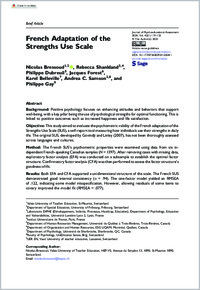French Adaptation of the Strengths Use Scale
IPC
- Bressoud, Nicolas ORCID Valais University of Teacher Education, St-Maurice, Switzerland; Department of Special Education, University of Fribourg, Fribourg, Switzerland
- Shankland, Rebecca Laboratoire DIPHE (Développement, Individu, Processus, Handicap, Education), Department of Psychology, Education and Vulnerabilities, Université Lumière Lyon 2, Lyon, France; Institut Universitaire de France, Paris, France
- Dubreuil, Philippe Department of Human Resources Management, Université du Québec à Trois-Rivières, Trois-Rivières, Canada
- Forest, Jacques Department of Organization and Human Resources, ESG UQAM, Montréal, Québec, Canada
- Belleville, Karel Department of Psychology, Université de Sherbrooke, Sherbrooke, QC, Canada
- Samson, Andrea C. Department of Special Education, University of Fribourg, Fribourg, Switzerland; Faculty of Psychology, UniDistance Suisse, Brig, Switzerland
- Gay, Philippe UER EN, Vaud University of teacher education, Lausanne, Switzerland
- 2023
Published in:
- Journal of Psychoeducational Assessment. - SAGE Publications. - 2023, vol. 42, no. 1, p. 119-125
English
Background: Positive psychology focuses on enhancing attitudes and behaviors that support well-being, with a key pillar being the use of psychological strengths for optimal functioning. This is linked to positive outcomes such as increased happiness and life satisfaction.
Objective: This study aimed to evaluate the psychometric validity of the French adaptation of the Strengths Use Scale (SUS), a self-report tool measuring how individuals use their strengths in daily life. The original SUS, developed by Govindji and Linley (2007), has not been thoroughly assessed across languages and cultures.
Method: The French SUS’s psychometric properties were examined using data from six in- dependent French-speaking Canadian samples (N = 1397). After removing cases with missing data, exploratory factor analysis (EFA) was conducted on a subsample to establish the optimal factor structure. Confirmatory factor analysis (CFA) was then performed to assess the factor structure’s goodness-of-fit.
Results: Both EFA and CFA supported a unidimensional structure of the scale. The French SUS demonstrated good internal consistency (α = .94). The one-factor model yielded an RMSEA of .122, indicating some model misspecification. However, allowing residuals of some items to covary improved the model fit (RMSEA = .077).
Objective: This study aimed to evaluate the psychometric validity of the French adaptation of the Strengths Use Scale (SUS), a self-report tool measuring how individuals use their strengths in daily life. The original SUS, developed by Govindji and Linley (2007), has not been thoroughly assessed across languages and cultures.
Method: The French SUS’s psychometric properties were examined using data from six in- dependent French-speaking Canadian samples (N = 1397). After removing cases with missing data, exploratory factor analysis (EFA) was conducted on a subsample to establish the optimal factor structure. Confirmatory factor analysis (CFA) was then performed to assess the factor structure’s goodness-of-fit.
Results: Both EFA and CFA supported a unidimensional structure of the scale. The French SUS demonstrated good internal consistency (α = .94). The one-factor model yielded an RMSEA of .122, indicating some model misspecification. However, allowing residuals of some items to covary improved the model fit (RMSEA = .077).
- Faculty
- Faculté des lettres et des sciences humaines
- Department
- Département de Pédagogie spécialisée
- Language
-
- English
- License
- Open access status
- hybrid
- Identifiers
-
- DOI 10.1177/07342829231205811
- ISSN 0734-2829
- Persistent URL
- https://folia.unifr.ch/unifr/documents/327808
Statistics
Document views: 79
File downloads:
- bressoud-et-al-2023-french-adaptation-of-the-strengths-use-scale: 115
